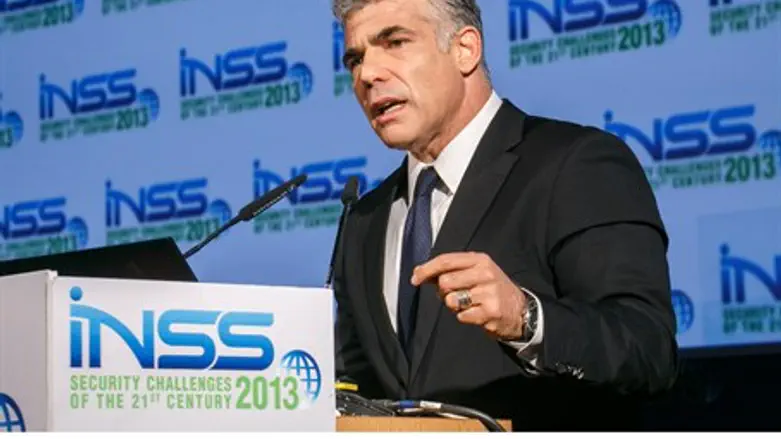
Finance Minister Yair Lapid presented his economic policies on Tuesday, and promised to “fight for the working man”.
Speaking at the annual conference of the Institute for National Security Studies, Lapid referred to some of the economic measures he intends to introduce in order to eliminate Israel’s deficit, and admitted that it will not be easy.
"The working man in Israel has not been at the center for quite a few years. He just pays the bills," Lapid said.
"If the average payment received by Israel for its natural resources is very low, and you all know that I am being gentle right now, then we sold the interests of the working man and we need to change that,” he added. “If hundreds of healthy people are living off of government allowances, then we sold the interests of the working man. If small groups control our ports, then in the name of the working man - we sold our interest.”
"The hole in the budget is an opportunity - it forces us to redefine priorities," Lapid said. "We have no choice. We cannot simply cruise on autopilot every year. We have no choice but to dive into each section and into every regulation that was passed late at night after the guard dogs went to sleep."
The Finance Minister admitted that it will not be easy to pass some of the budget cuts, saying, “You all know that there will be a war over some of the things I mentioned here. And I say: Let there be a war. Because it's time to wage this war. I'm a patient man but I also confess that if you believe in something, it is better to get it going in your first 100 days in office.”
"I believe that people with hope are those who are willing to sacrifice more because they do not perceive it as a sacrifice but as an investment,” said Lapid. “Our job, my job is to issue this hope. We’ll turn it into an affordable apartment for a young couple, we’ll turn it into army enlistment for all, cost of living that can be met, an education system that will make us proud, and above all - turn it into a new Israeli society that places the working man at the center.”
Meanwhile on Tuesday, a draft circulated of the cuts Lapid intends to implement shows that the hareidi population and the hareidi education system will be among those affected. Among other things, the funding to hareidi schools that do not teach core subjects and are not recognized by the Ministry of Education will be cut. According to the draft, only institutions that teach 55% of the core curriculum will be subsidized.
The draft also says that child care subsidies will only be given to families in which both parents work. This requirement will also apply to those who seek a reduction in municipal taxes.
Lapid also plans to cut the defense budget and, referring to that cut in his remarks on Tuesday, said, “Contrary to all the stories, the defense establishment is showing openness and understanding that should be praised. I have been speaking quite a bit with the new defense minister and the chief of staff and they both understand that we are in a different economic reality, and they are willing to take part in the effort.”
Earlier on Tuesday, Bank of Israel governor Stanley Fischer expressed support for Lapid’s budget for the next year.
Fischer had strongly opposed a previous proposal to increase the deficit.
However, following the meeting he praised Lapid’s plan to increase the deficit by a maximum of 3% through 2014. "I commend this bold decision, which is essential for the stability and prosperity of the Israeli economy,” he said.
On Monday, in a speech from the Knesset podium, Lapid argued that hareidi MKs had played a part in running up the deficit, and lashed out at them saying, “The state is sick of taking orders from you… You aren’t registered as the rightful owners of the government.”
Responding on Tuesday to Lapid’s speech, MK Moshe Gafni (United Torah Judaism) told Arutz Sheva, “Lapid came up with a media spin that unfortunately worked for him.”
“Lapid was in Knesset [Monday] to talk for the first time about the financial cuts and cuts to social welfare that his ministry is going to impose on the citizens of Israel. He understood that both the Knesset and the media are very critical of him, so he decided to attack me and the hareidi community, and instead of talking about budget cuts he talked about hareidi Jews,” he continued.
“I had a personal conversation with Lapid,” Gafni revealed. “I told him that we will not allow him to dodge the problems posed by the budget cuts.”
“Lapid committed to a different kind of politics and a different economic approach,” he added. “We will hold the discussion and will not let Lapid make it personal.”
